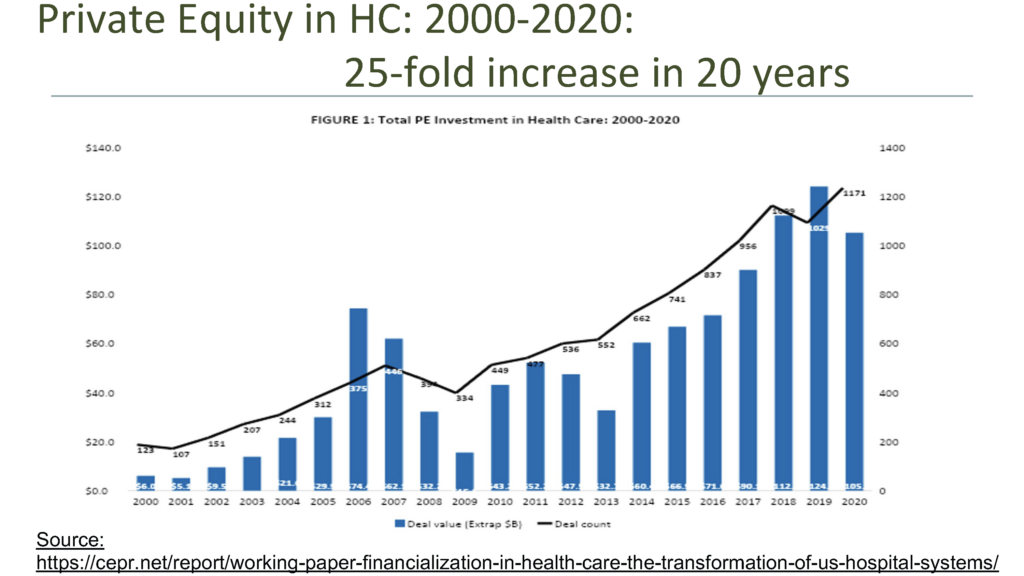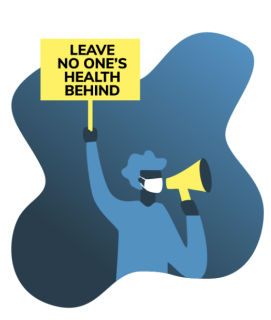LEAGUE POSITION ON HEALTHCARE REFORM
“Impact on Issues,” LWV Official Policy Document
The national League’s position clearly supports “a national [program] financed through general taxes in place of individual…premiums” — now also called Improved and Enhanced Medicare for All.
The following points are found in the League’s Position on Health Care in Impact on Issues 2024-2026, pp. 157-159.
- The League favors a national health insurance plan financed through general taxes in place of individual insurance premiums (p. 157, paragraph 5).
- The League supports the single-payer concept as a viable and desirable approach to implementing League positions on equitable access, affordability, and financial feasibility (p. 157, par. 6).
- The League is opposed to a strictly private market-based model of financing the health care system (p. 158, par. 2).
- Specific cost-control methods should reflect the most-credible, evidence-based research available on how health care financing policy affects equitable access to health care, overall quality of care for individuals and populations, and total system costs of health care and its administration (p. 158, par 4).
- The League favors health insurance access independent of employment status (p. 157, par. 6).
(Note: The current Impact on Issues was updated to reflect the Update Concurrence that was adopted at the 2022 National Convention. Concurrence with the LWVNY Health Care position strengthened several aspects of the position. The position, including 7 pages of the “History,” the steps in the development and use of the position, click here. For a flyer with short overview of the concurrence from a local League member, click here. (See a Glossary for “League-specific” meanings of terms like “position” and “concurrence.”) For information on the 2024 Vermont Privatization Position Update Concurrence Campaign, click here.
History of LWVUS Healthcare Advocacy (pp. 159-163). This section chronicles actions including testimony before Congressional committees, coalitions with groups that support Single Payer health care, amicus briefs, and a large-scale education campaign on health care issues undertaken in conjunction with the Kaiser Family Foundation (KFF).
Events during the COVID-19 Pandemic exposed tragic shortcomings of the Affordable Care Act and other reform efforts based on for-profit insurance: the pandemic has deepened racial disparities in healthcare and for-profit business models have severely weakened our public health infrastructure.
Under the ACA, for-profit insurers have achieved record profits while medical costs have continued to rise many times faster than wages, and health outcomes for Americans have worsened. In the pandemic, the US, with only 4% of the world’s population, has suffered 16% of its deaths. The ACA has not provided a path to universal and affordable healthcare, nor sufficient investment in public health to fight the coronavirus.
Current Opportunities for LWV Healthcare Advocacy
HCR4US proposes that the League remains true to its stated goals when it advocates strongly for Single Payer/ improved Medicare for All.
Steps LWVUS has taken in the past:
- Testifying before Congress,
- Joining coalitions to support bills (like HR 3069) that propose single-payer programs,
- Supporting grassroots reform efforts within the League and with League allies.
All of these actions remain important contributions toward achieving the League’s goal of universal, comprehensive, high-quality care that is affordable for the individual and sustainable for the country.

Watch a two-minute clip with statement by LWVUS Director of Government Affairs, Jessica Jones Capparell, in response to a question during an LWV-MA program April 2022: Q: “Does the League support a Medicare for All system of health care?” A: Yes!
Impact on Issues as a Guidebook for Advocacy Action within LWV guardrails
https://lwvhealthcarereform.org/wp-content/uploads/2025/07/TakeAction_Pages_LWV-impact-issues2024-26.pdfIn its effort to have the League “Speak with One Voice,” (p. 2) this document outlines levels of responsibility and levels of approval for action. The section on “Taking Action” (pages 2-9) distinguishes Advocacy versus Lobbying, and Grassroots versus National level action, and gives links to helpful forms, for example the Federal Action Request Form (or a FARF).
For advocacy on non-priority issues at the federal level, topics other than Making Democracy Work and Diversity priorities (like Health Care Reform and Climate), state and local Leagues must coordinate with LWVUS through Action Alerts and/or “FARFs”). Read more
Other Avenues of Communication from LWVUS to local Leagues and members
- Action Alerts
- Official, informal guidance on specific topics (for messaging and advocacy
- Messaging Guidance Project 2025 (Fall 2024)
- Talking Points on HR 9495 –**NEW**
- (President’s) bi-weekly “League Update” — Subscribe here.
Studies and research undertaken mostly for supporting position statements are catalogued here in the LWVUS Clearinghouse https://sites.google.com/a/leagueofwomenvoters.org/clearinghouse/.
Ways to use this Toolkit
The purpose of this site is to share League study documents among some 800 national, state and local Leagues and with the public. Leagues can save time by not reinventing study materials and see how other Leagues have approached a tough issue. Visitors may download and print the documents. League members may submit documents for this site.
Priority Topics
Single Payer/ Medicare for All as a Racial Justice Issue
At the 2020 Convention, the LWVUS by-laws were amended to place the League’s commitment to a Diversity, Equity, and Inclusion (DEI) policy on a par with the bedrock League policy, its non-partisanship. Following the amendment, all local and state Leagues are strongly encouraged to include these two foundational policies in their bylaws modeled on Article II of the LWVUS bylaws.
DEI considerations underline the alignment of Single Payer Health Care reform with the foundational policies of the League.
See DEI policy in Impact on Issues (pp. 3-4). Link to DEI resources on the Management Site. Link to Bylaws Template. See resources for DEI/Healthcare advocacy and education in Toolkit Resources.
Unprecedented growth of PRIVATE EQUITY INVESTMENT in Health Care makes the LWV position on PRIVATIZATION relevant to Health Care Advocacy.
In addition to failing to achieve goals of the League’s Health Care Position, the current “financialization” of health care violates the guidelines of the LWV position on Privatization. Full wording of the 2012 position from pages 63-64 of the 2022-24 Impact on Issues can be found here. The position does not categorically oppose “the transfer of governmental services, assets, and/or functions to the private sector,” as long as “transparency, accountability, and preservation of the common good” can be ensured. The need to safeguard public health is highlighted with this warning:
Privatization is not appropriate when the provision of services by the government is necessary to preserve the common good, to protect national or local security or to meet the needs of the most vulnerable members of society.

Private Equity (PE) investment in health care has made the sector 2nd only to Apple and Amazon in profitability, but NOT health care excellence. More and more studies describe the rapid decline in quality of care and outcomes.
The fallout from PE, sometimes called “vulture capitalism on steroids,” is gaining more media attention. The statistics on health outcomes are grim. CBS Morning (12/6/22) broadcast an 8-minute segment that graphically illustrates the business model that plunders the assets of facilities it acquires. A March 2023 overview from Public Citizen, titled “Private Equity’s PATH OF DESTRUCTION in Health Care Continues to Spread” puts the conflict between health and outsized profits in clear perspective in the first few pages, and then chronicles the danger to our health infrastructure in 15 health sectors, with ample footnotes and pointers to more information. In addition, the HCR4US YouTube channel has two videos (so far) of programs detailing the troubling trend. The “Get Involved” page of this Toolkit includes testimony in favor of a state-based single-payer bill as a defense against the ravages of Private Equity.
- “How Private Equity Makes Us Sicker,” 10/18/22 PNHP NY-Metro Forum. The video is 90 minutes, but we have put “timestamps” under the video for each of the sections: Overview J. Esterquest; Speakers Rosemary Batt, Professor of Industrial and Labor Relations, Cornell; Robert MacNamara, MD, Am. Acad. of Emergency Medicine; Richard Mallot, JD, LongTerm Care Community Coalition; then Call to Action and Q&A. The section by Professor Batt gives a detailed description of how the “private equity business model” works to dismantle the assets it acquires, so we have pulled out her section as a separate video (25 min). Or Download Slide deck.
- “Medicare for All Congressional Caucus” 9/20/22, hosted by Reps. P. Jayapal and D. Dingell. Subtitle: “[how] private entities are profiteering in our current healthcare system and how Medicare for All would stop that.” With guests Eileen O’Grady, Private Equity Stakeholder Project; Don Berwick, former head of CMS; Susan Rogers, PNHP President; Eagen Kemp, Public Citizen; Cathy Kennedy, RN, National Nurses United. Timestamps are found below the title of the film. Each of the main speakers had 2 segments. Look for the timestamps below the title to jump to a specific place in the video.

State and National LWV Resolutions, Studies, and
Other Documents on Health Care Reform
For a GLOSSARY of some League-specific terminology for Actions discussed in this section, click HERE.
- 2023 Developments
- New LWV Vermont Position on Privatization (with a focus on Health Care), adopted December 14, 2023, is available at this link. The Vermont League’s study that lay the foundation for their position determined that health care met the definition of a public good and also demonstrated that for the most part, privatized medical services delivered worse care at a higher price, and were available only in areas where making a profit on services was viable. Thus, in the new position that protects public funding for and access to medical services, subsequently adopted by the Vermont membership, criteria are outlined for both privatization and de-privatization, and health care is covered. Read more.
- 2022 Developments
- Health Care Update Concurrence. A campaign to update the LWVUS Healthcare position by incorporating elements from the new NY State positions in its official statement in Impact on Issues was successful. The concurrence proposal, put forward by the NYS Update Committee and disseminated by HCR4US, did not change the goals or main tenets of the position, but added and clarified it to reflect important changes in U.S. healthcare since 1993. (See highlights of the NYS innovations below in “2021 Developments.”) Delegates at the LWV biennial Convention in Denver in June 2022 voted 868 to 8 to adopt the concurrence. For more details of the Update, please click here: Health Care Update concurrence
- New Digital Equity Position. The Rural Affairs Caucus put forward a concurrence to add the Connecticut state position on Digital Equity to Impact on Issues. For more details on the Digital Equity concurrence, please click here, or go directly to the Digital Equity webpage hosted by LWV New Mexico. For more background on Rural Health care please visit the Rural Affairs Caucus page on this website.
- Convention Caucuses
- 2021 Developments
- New NY State Healthcare Positions, on healthcare and the financing of healthcare. In 2020, the New York State League Healthcare Positions Update Committee (2019-2021) proposed two new positions to replace the two NYS positions adopted in 1991. The committee submitted the new positions to all Leagues in the State and facilitated the Consensus Process. In March 2021, Both new positions were formally adopted.
Highlights of NYS new Healthcare Positions (2021) — changes from the 1991 positions- Changes to guidelines for safe staffing, public health disparities, and comprehensive care (including vision, dental, hearing, and long-term care) without any financial barrier to access.
- Separating insurance from jobs: “funding supported in part by broad-based and progressive state income taxes with health insurance access independent of employment status.”
- Supporting state-based universal single-payer healthcare (in the absence of a healthcare financing system that includes all residents of the United States).
- Creating a healthcare trust fund managed by the NY Health Trust, that operates in a similarly efficient fashion as Social Security or Medicare trust funds.
- The full packet of the Study materials from the Update Committee is available here, and the “executive summary” with footnotes is here. Note that no cost-control measures in the NY position are in opposition to the LWVUS position, but constraints would preclude supporting some LWVUS cost-control methods. (Appendix C covers Cost-Sharing.)
- The Study Materials (available here) (Appendix C covers Cost-Sharing)
- New NY State Healthcare Positions, on healthcare and the financing of healthcare. In 2020, the New York State League Healthcare Positions Update Committee (2019-2021) proposed two new positions to replace the two NYS positions adopted in 1991. The committee submitted the new positions to all Leagues in the State and facilitated the Consensus Process. In March 2021, Both new positions were formally adopted.
- Formation of a National Rural Affairs Caucus, with an initial focus on Healthcare.
- Based on the Rural Caucus of LWV-NY, HCR4US invited League members from around the country to enable resource sharing, consultation, and collaboration among Leagues and League members in rural areas. It aims to encourage the formation of MAL Units and League Chapters in rural areas to increase the League’s advocacy and education outreach, and also focus the attention of state Leagues on the needs of residents of rural areas.
- The form to express interest can be accessed here: Rural Affairs Caucus Interest form. For more information about rural health care issues, consult the Rural Affairs Webpage on this site, and/or contact the RAC leader, Kathleen Stein at this email: lwv.rac@gmail.com
- 2020 Health Care Caucus (to be added)
- 2020: LWV-WA Position Statement on Healthcare
- 2019 Medicare for All Resolutions at State Conventions
- 2015-2016 LWVUS Position broadened to include full access to behavioral healthcare.
- In 2015, LWV of Colorado finished an official study on Mental Health Care in Colorado, and petitioned the state League to include access to Quality Behavioral Health Care in their Health Care position statement. Their 45-page study includes: need for services, Colorado’s current service delivery system, stigma and barriers to effective service delivery, and new and promising practices.
- To access the LWV-CO study materials and the Behavioral Health Position, download from the LWV-CO website or the LWV-US “clearing house” (Go to Social Policy, Mental Health Care, Studies, 2015 Colorado Behav. Health Study) https://sites.google.com/a/leagueofwomenvoters.org/clearinghouse/home
- In 2016, LWV-CO presented the state’s new position to the national League, which adopted it “by concurrence” at the national convention.
- 2010 LWVUS Resolution passed by delegates at the National Convention calling upon the LWVUS leadership to advocate strongly for Improved Medicare for All legislation
LWV ROLE in UNITED NATIONS GLOBAL UNIVERSAL HEALTH CARE INITIATIVES
Since 1945 (under President Truman), LWV has been an official consultant organization to the U.S. United Nations Delegation supporting global UN social and economic initiatives. LWV-UN Observers sit at public meetings of the UN Economic and Social Council, and give input to the Delegation. Read more…

Annually on December 12, local Leagues advocate in concert with the UN on behalf of millions around the world without access to adequate health care. Find out more… (Official UN Universal Health Coverage Day here)
Health Care Reform for the U.S. (HCR4US) Google Group/Network:
- History of HCR4US 2005 to the present
Directory of States in our network: Contact HCR4US to find fellow advocates in your state or add your state to our network:
Alabama, Alaska, Arizona, California, Colorado, Connecticut, District of Columbia, Delaware, Florida, Georgia, Idaho, Illinois, Indiana, Iowa, Kansas, Kentucky, Louisiana, Maine, Maryland, Massachusetts, Michigan, Minnesota, Missouri, Montana, Nebraska, Nevada, New Jersey, New Mexico, New York, North Carolina, Ohio, Oregon, Pennsylvania, Rhode Island, South Carolina, Tennessee, Texas, Utah, Vermont, Virginia, Washington, West Virginia, Wisconsin, Wyoming - Link for Minutes of monthly calls from Dec 2018 to the present
- How to JOIN. Use the HCR4US Contact form to join the network.
Check out our page to help you…
GET INVOLVED – Suggestions for individuals and local Leagues


